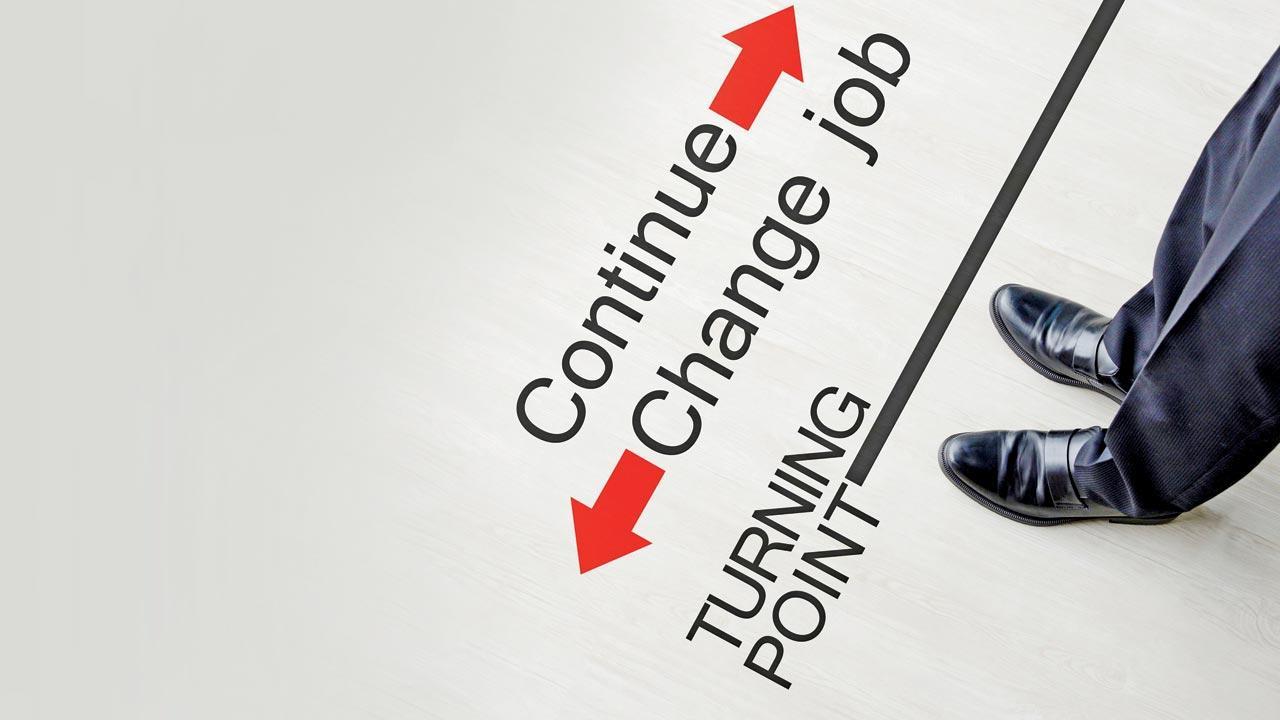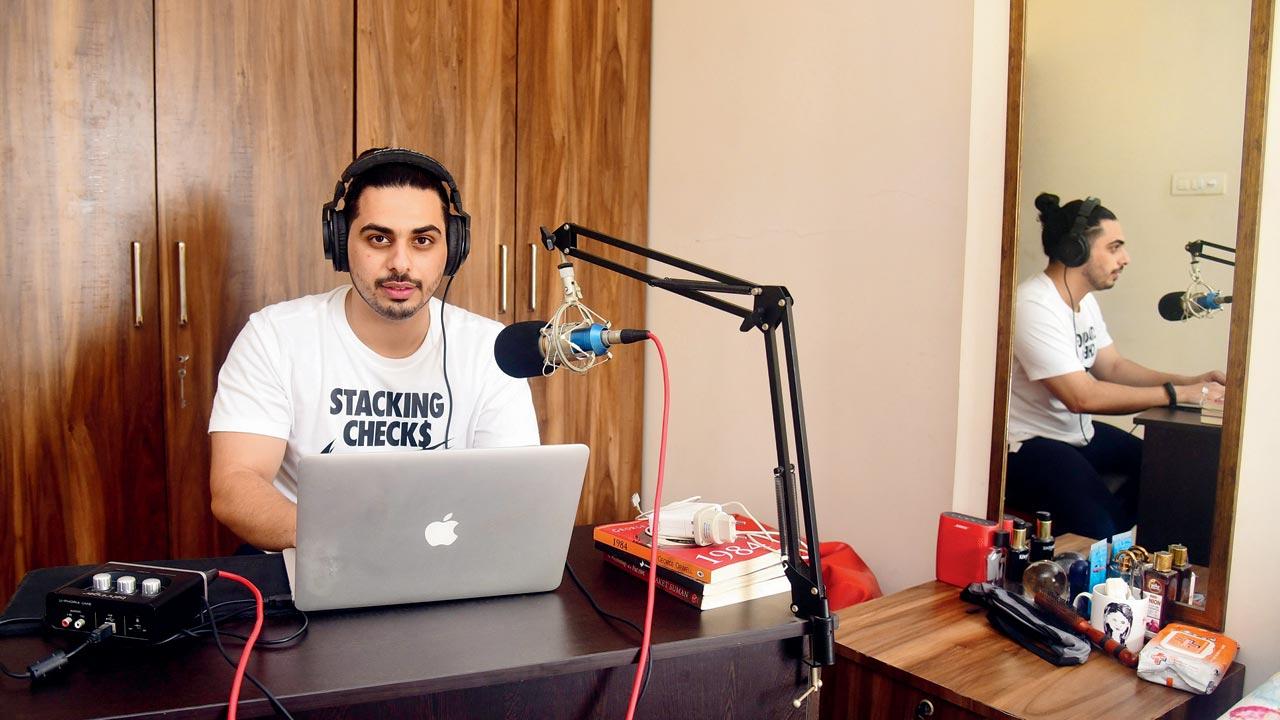Ineffective healthcare measures by firms, forced return to office and greater emphasis on choice among top reasons for India mirroring global trend in what experts describe as the age of anti-stability

Representative Image. Pic Courtesy/ iStock
This writer’s Twitter handle has rarely elicited any reactions. In the last 12-odd years of being on the micro-blogging social media platform, we’ve enjoyed the silence our inactivity has generated. The moments of engaging in arm-chair world views, arguments and witty repartee have been few and far between. So, when we queried about people who quit their jobs in 2021, we weren’t expecting to be inundated.
ADVERTISEMENT
At last count, we had 467 comments, 272 retweets, and 1,580 likes. “Thank you for asking,” one person said, before explaining—without being prodded—why they had resigned. “I do not want to work anymore. I am sick to my gills of Indian corporate culture and majoritarian toxicity,” another added. It’s as if everyone was waiting for the nudge to speak up. This growing tide of discontentment with work, however, is not restricted to this Twitter thread alone. Globally, the job market is experiencing an unexpected turn of events.
 (From left) Ronjini Bora, Kevin Harding and Prekshaa M quit their jobs in 2021 to focus on doing things that made them happy. While Bora says that putting in long hours at work had made her cranky and anxious, Harding says he discovered his entrepreneurial skills during the lockdown, and wanted to give it a shot
(From left) Ronjini Bora, Kevin Harding and Prekshaa M quit their jobs in 2021 to focus on doing things that made them happy. While Bora says that putting in long hours at work had made her cranky and anxious, Harding says he discovered his entrepreneurial skills during the lockdown, and wanted to give it a shot
While in early 2020, when the pandemic first reared its ugly head, the looming lay-offs, pay cuts and prevailing job uncertainty, had seen resignations plummet, in 2021, the workforce is said to have experienced a collective burnout, causing people to leave their jobs. The phenomenon is being described as the Great Resignation or Big Quit.
According to the US Labour Department, around 4.5 million employees left their jobs in November 2021 alone, a trend that was observed since September that year with three per cent of the workforce quitting their jobs each month. As per estimates, this amassed to 75.5 million resignations in America that year. India, on the other hand, has been in the throes of a peculiar situation. While the country’s unemployment rate, according to independent think tank the Centre for Monitoring Indian Economy (CMIE), reached 7.91 per cent in December 2021 (9.30 per cent in the urban pockets), Indians haven’t been spared of the sweeping resignation movement either. A report by Dainik Jagran highlighted that leading IT companies such as TCS, Wipro, and Infosys had witnessed high attrition rates of around 20 to 25 per cent in the last quarter of 2021. Following the Great Resignation, top IT companies hired around 1.7 lakh people last year.
There are a host of reasons for this shift, the standard ones being low salaries, poor relationship with colleagues and difficult management. But in the COVID-19 era, newer concerns have emerged. Burnout, need to prioritise mental and physical health, being forced to return to work after working remotely, desire to change the job industry, and inadequate pandemic health measures, are some of the top issues that have been cited. Many, who responded to this writer’s Twitter query, quit without a job offer.
 Kevin Harding gave up a corporate communications job to focus on his podcast and build a travel community. Pic/Shadab Khan
Kevin Harding gave up a corporate communications job to focus on his podcast and build a travel community. Pic/Shadab Khan
The New York Times has termed this phase as the “age of anti-ambition”. Malcolm Mistry, director of Ushta Te Consultancy Services LLP, an established solution provider in the HR domain for permanent staffing, says he’d describe this as the “age of anti-stability”. “Our parents’ generation did the same job all their working life; people are no longer seeking such stability,” he says. He points out how contractual, contingent work, where the payment is usually on a piece-work basis, typically part-time or non-permanent with limited job security, is no longer frowned upon. Earlier, when Mistry’s company did contingent hiring, he remembers having to convince people about the role. “Now, people are open to short-term stints. They wouldn’t bat an eyelid if a good, short opportunity came their way.”
Forty six-year-old Rajiv Dogra says the pandemic has personally been a time of reckoning. The former journalist from Mumbai, shifted gears in 2012 when he started an independent agency with a small team, which designed and edited supplements outsourced by two national dailies. “We worked for them as vendor partners. Everything was going fine, until the pandemic. Overnight, we lost 90 per cent of our business.” Dogra, who moved to Ludhiana with his wife and daughter in 2019, remembers experiencing several months of financial uncertainty, when an unexpected opportunity came from an Andheri-based PR company in November 2020. The role was that of a research and content head. “Since it was a work-from-home opportunity, I decided to take it up.” The beginning was hunky-dory—Dogra had his weekends intact, there was a monthly pay cheque coming home, and more importantly, he was being exposed to an entirely new media industry. The erratic work hours were a dampener, but he decided not to make much of it. Things changed when offices started opening in 2021. “My boss wasn’t in favour of working from home.” Since Dogra had taken up the role because it was a remote opportunity, he didn’t budge. “That’s when I began noticing my senior use psychological ploys to undermine my work. I would get picked on. This control was getting to me.” Despite the stability the job offered, Dogra quit in October 2021. “I didn’t have another job in hand. But, I was confident about tiding over this period too.” He took to LinkedIn to network. He now freelances for a portal with mental health and wellness content, while ghost authoring two books. “Though, there’s always this lurking fear about where the next month’s salary will come from to pay my bills, I feel like I have a greater control over life. That’s a liberating feeling. It has made me more confident of myself and my abilities,” says Dogra adding, that he now intends to focus on taking up organic farming.

Ronjini Bora has been on a break since she quit her job as marketing manager, digital and publicity, for a publishing house in October 2021. She says the long-drawn remote work hours were taking a toll on her health, leaving her exhausted. Pic/Nishad Alam
Delhi-based Ronjini Bora has been on a break since she quit her last job as marketing manager, digital and publicity, for a publishing house in October 2021. “I had been working for 10 years straight, and needed to pause.” Bora had taken up the job a month before the pandemic hit India, and had barely got to know her colleagues. “In December 2020, 10 staffers were asked to leave. Although I was new, they retained me. That was an uncertain professional phase for most, and we were all just trying to stick it out,” she says in a telephonic interview. It was in 2021 that monotony began to kick in. “I was putting in more than 10 hours of work, and since I was working remotely, I got no real breaks. It was exhausting. My father, who lived in Guwahati, was also fighting cancer. Nothing was helping my situation. I was anxious and cranky, and my husband had pointed out a change in my behaviour. In June 2021, I decided to resign, but the company didn’t agree, and asked me to take a few weeks off. I tried that, but it didn’t work for me.” In October the same year, she called it quits. Soon after, she lost her father. “I needed this break. I have become a lot calmer, am getting sufficient sleep, and that has been a boon. Though, am struggling financially, for some reason, I am not worried. I have been getting interview calls and opportunities, but I still feel tired. I think I need another two months before I can go back to a full-time job.”
Writer and podcaster Noreen Malone, in her NYT Magazine article, shared that almost “no one I know likes work very much at the moment”. “The primary emotion that a job elicits right now is the determination to endure: If we can just get through the next set of months, maybe things will get better,” she wrote.
 Malcolm Mistry, Ushta Te HR Consultancy services
Malcolm Mistry, Ushta Te HR Consultancy services
This “determination” seems to be crumbling slowly. Work environments have always been demanding, but it seems to have exacerbated during the pandemic. And many didn’t like what they saw.
A Hyderabad-based NGO professional quit her toxic workplace in September 2021. When she did the math, she realised that finances are tight but she could afford to go six months without a pay. Quitting her job, she says, taught her that not being without a job “isn’t the worst thing in the world”. Another person who quit her job in mid-2021, shared, “When you have already faced a pandemic, where you are afraid of stepping out of your door, the risk of not having a job may seem far less.”
 Rajiv Dogra found a job as research and content head at an Andheri-based PR company in November 2020, but quit a year later during the pandemic, to focus on himself. He is ghost writing two books and intends to turn his attention to organic farming
Rajiv Dogra found a job as research and content head at an Andheri-based PR company in November 2020, but quit a year later during the pandemic, to focus on himself. He is ghost writing two books and intends to turn his attention to organic farming
Not everyone quit because they disliked work. Prekshaa M, 30, who was employed with a leading non-profit, says she loved her job. “I joined work in the pandemic, and honestly, it was a great environment to work in. I also created some amazing campaigns,” she recalls. But, having successfully worked remotely for a major part of 2020, Prekshaa realised that she didn’t require to be in an office environment to do the same tasks. “By the time I was asked to return to office, I had begun enjoying a routine, where I’d go for an evening walk, and spend time with the strays in my neighbourhood. They taught me resilience, and how to prioritise and be selfish about resting. This wasn’t possible because most of my time was spent commuting.” She resigned in August last year.
That she had been working since she was 17 makes her feel like, “I kept borrowing from tomorrow to get through today and then I just couldn’t anymore. This sabbatical has made me a healthier and happier person.”
 Prekshaa M, 30, was employed with a leading NGO in Mumbai until August last year. She says she has been working non-stop since she was 17. “I kept borrowing from tomorrow to get through today, and then I couldn’t do it anymore. The decision to resign has made me a healthier and happier person.” Pic/Shadab Khan
Prekshaa M, 30, was employed with a leading NGO in Mumbai until August last year. She says she has been working non-stop since she was 17. “I kept borrowing from tomorrow to get through today, and then I couldn’t do it anymore. The decision to resign has made me a healthier and happier person.” Pic/Shadab Khan
Some like Kevin Harding say that the pandemic enabled him to recognise the entrepreneur within him. The 28-year-old had a successful career in corporate communications, when he decided to resign and focus on building his travel community. Having got a promotion and salary hike early on in the pandemic, Harding remembers having little to complain, except that his responsibilities had increased. “Around this time, I started my own travel podcast, Balancing the Act. I shared this development with my boss, and he was fine with it. It helped me connect with like-minded people, and make more friends. All of a sudden, the podcast blew up,” he says. By November 2020, he started experiencing a “mind-shift”. “I felt the need to start something on my own. The pandemic gave me more time to introspect.” Harding left his organisation in early 2021. After a short break, he took up small gigs as brand marketing consultant, but eventually went on to start his own travel community, Bagpacker Me, while running his podcast.
Guncha Khare is the culture director at Dextrus workspace, where she works on the brand, marketing and operations strategy and is also the key human resource lead. She admits that all sectors have been impacted due to wave of resignations.
“Due to the pandemic, organisations were forced to change their processes to ensure that business continued. Employees realised that jobs for which they had to slog hours, commute long distances, be away from family and cut short vacations, could all easily be done remotely,” she says. This had led to a major mind-shift. “The fact that people have started reprioritising what they want from work life, has pushed organisations to re-evaluate right down to rethinking JDs [job descriptions]. Earlier, business sustainability was mostly given priority over human capital. But, with what is happening right now, companies are looking at what needs to be done, to retain people.”
She, however, says that there are also those who are staying back, despite the market flux. “Understanding why they are choosing to stay back, can also help address the problem. HR teams need to have these conversations.”
Mistry believes that while pandemic fatigue and desire for a better quality of life have played a part in rethinking careers, the boom in the economy has also paved the way for newer opportunities. “There are of new jobs that are being created, and unfortunately, the supply of talent is not adequate to take care of positions opening up. For people who needed to change jobs, or were in an unhappy environment, this is a golden parachute. They are looking at this as a now-or-never situation,” he says. Those who are taking breaks in their careers, he feels, are possibly also bolstered by this boom. “It at least gives them a sense of security and confidence—that they can return [to the job market] after a month or two, and still have something waiting for them,” he says.
He, however, feels that while “remote” and “hybrid” worked well till it lasted, “you tend to lose a lot of communication, team building and camaraderie” in the process. “Some organisations can lose their identity entirely. Because your identity is a collection of how the organisation thinks and works. That’s why many companies are insisting that people return to work.”
25 per cent
Attrition rate at large Indian IT firms in last quarter of 2021
Top reasons to quit post-pandemic
Burnout
Inadequate pandemic health measures
Forced to return to office after WFH
Need to prioritise mental and physical health
Desire to change job industry
What can organisations do?
Listen to your employees: Have conversations with them, ask them about their expectations from the job, what their grievances are, and what can be offered, and what can’t. Make them feel valued.
Good leaders: During the pandemic, while productivity increased, so did the burnout. Many organisations were able to counter this by equipping their managers to become better managers. Managers who were able to create more fluid systems, where they were just helping employees manage their work, as opposed to extracting work out of them, were able to make a huge difference.
Flexibility is key: What people want, and have got a taste of is that they can offer value by working remotely. But virtual environments can also be isolating. Organisations need to give employees the flexibility of working from home when possible, or allowing them to leave early, come in late, etc.
Courtesy: Guncha Khare
 Subscribe today by clicking the link and stay updated with the latest news!" Click here!
Subscribe today by clicking the link and stay updated with the latest news!" Click here!







